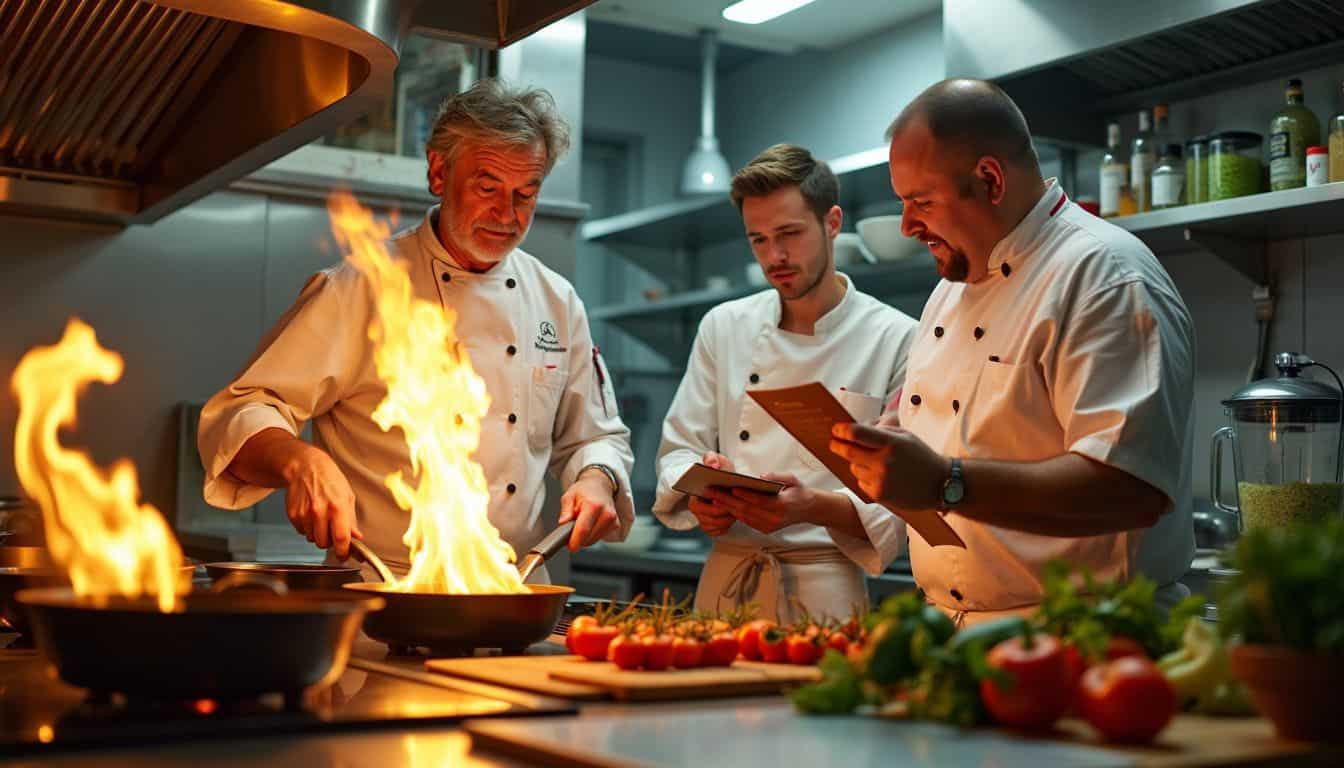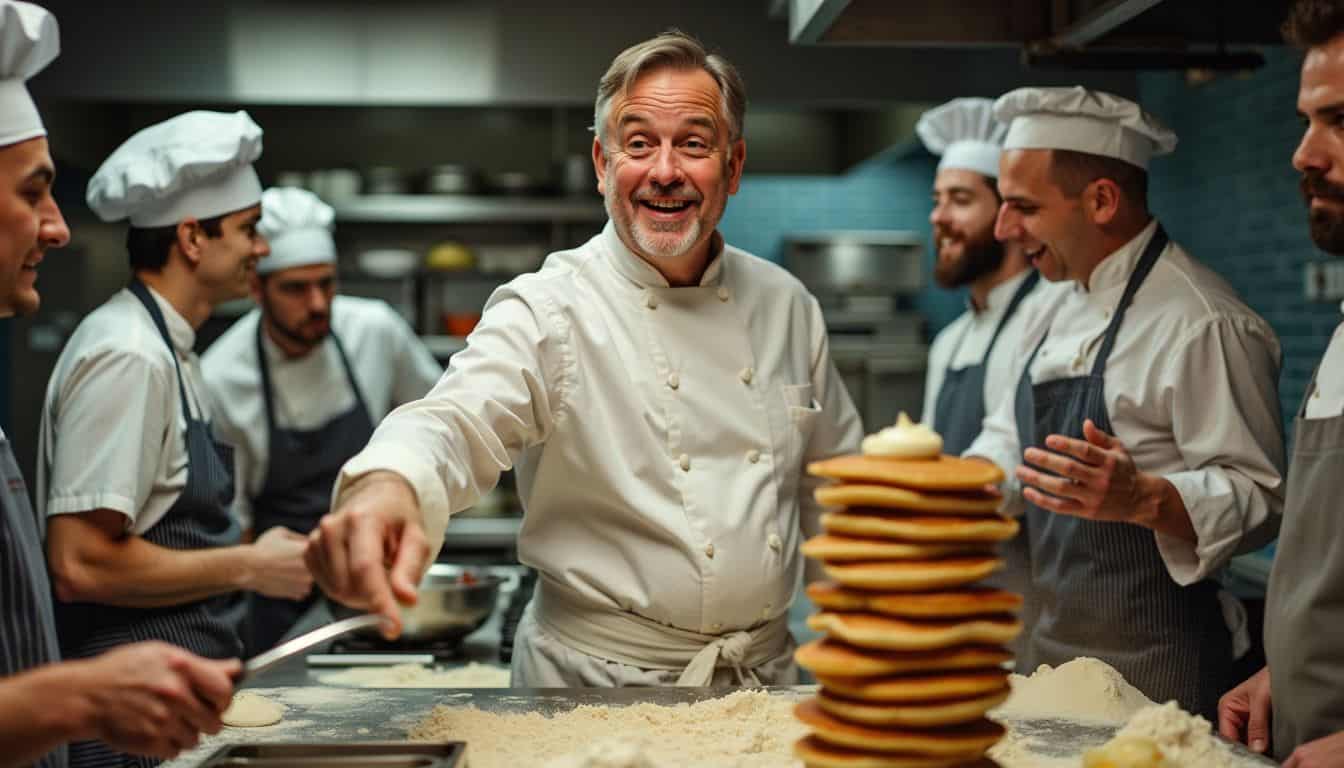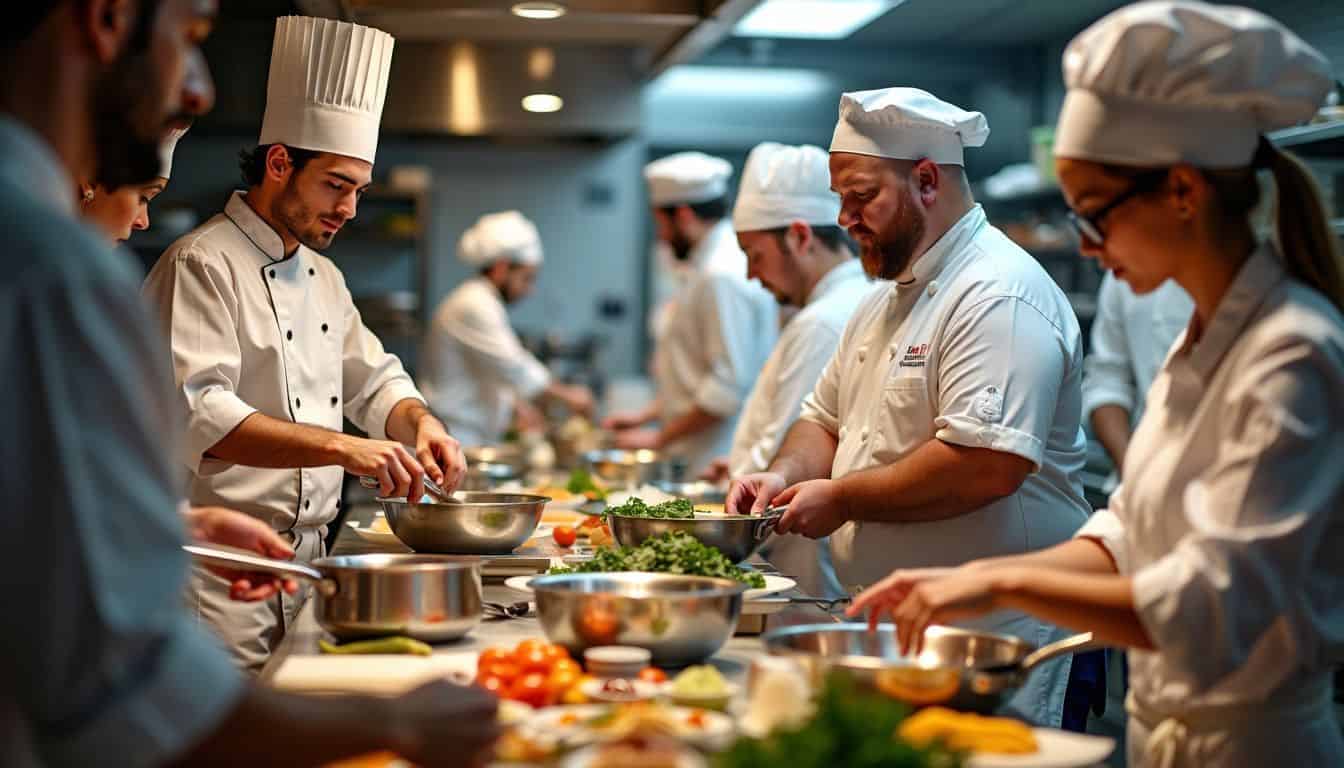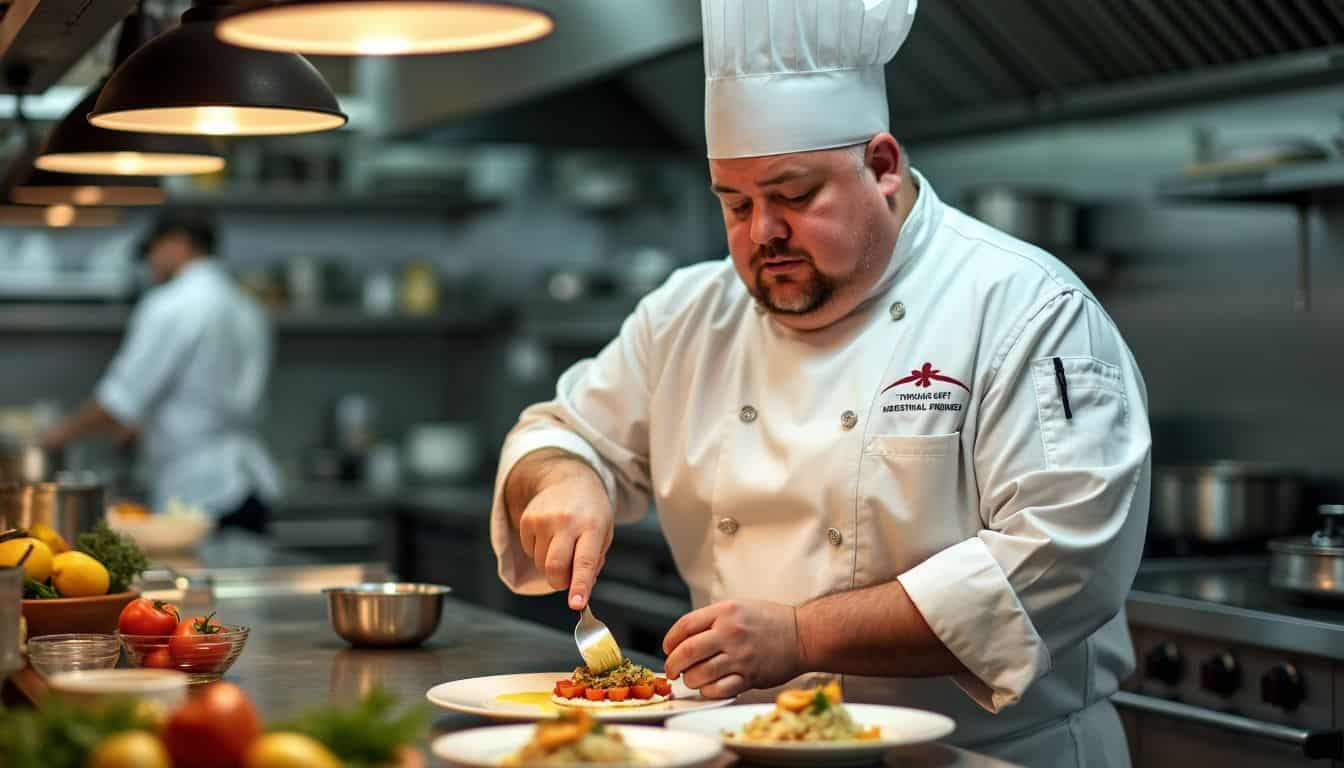Ever dreamed of becoming a chef but don’t know where to start? You’re not alone. Many aspiring cooks feel unsure about turning their passion into a career. Did you know that the job outlook for chefs is growing faster than average? That’s right – there’s never been a better time to enter the culinary world.
This article will serve up 7 sizzling steps to help you become a chef and reach culinary stardom. Ready to heat things up?
Key Takeaways
Becoming a chef involves getting culinary education, hands-on experience, and climbing the kitchen hierarchy from entry-level jobs to executive chef roles.
Culinary school costs range from $19,569 to $39,365 for programs at Auguste Escoffier School, with 95% of Austin students receiving financial aid in 2022-23.
Chefs earn a median annual salary of $58,920, with top-paying states like Hawaii offering $99,520 per year.
Joining professional groups like the American Culinary Federation (17,500+ members) or Bread Bakers Guild of America ($100/year) can boost your career through networking and learning opportunities.
The job outlook for chefs is growing faster than average, with about 24,600 chef jobs opening up each year.
Table of Contents
Exploring the Chef Profession

Ever wondered what it’s like to be a chef? It’s not all glitz and glamour – but it’s a heck of a ride! From creating mouth-watering dishes to running a busy kitchen, chefs wear many hats… and not just the tall white ones.
Role and Responsibilities of a Chef

Chefs run the show in kitchens. They’re the bosses who keep everything humming along. From creating menus to training staff, chefs wear many hats. They make sure the food tastes great and looks good too.
Chefs also keep the kitchen clean and safe. It’s not all glamour – they often work long hours, including nights and weekends.
Being a chef means juggling lots of tasks. They order ingredients, plan work schedules, and manage the budget. Chefs also need to stay cool under pressure. When the kitchen gets busy, they keep their team focused and working together.
The kitchen is my stage, and every dish is a performance.
It’s a job that needs creativity, leadership, and a love for food all rolled into one.
Various Types of Chef Positions

Kitchens are like mini-kingdoms, with different chefs ruling their own little corners. At the top sits the Executive Chef, the big boss who runs the whole show. They’re not usually elbow-deep in cooking, but they call the shots on menus and kitchen operations.
Right below is the Sous Chef, the trusty sidekick who keeps things running smoothly when the boss is away. Then there’s the Pastry Chef, the wizard behind those mouthwatering desserts and baked goodies.
They’re the ones who know which apples to use for the perfect apple pie!
Let’s not forget about the unsung heroes – the Commis Chefs. These newbies are just starting out, learning the ropes and doing a bit of everything. And then there’s the Saucier, the sauce boss who whips up those tasty gravies and dressings.
I once worked with a Saucier who could make a sauce so good, you’d want to drink it straight from the pot! Each role is crucial, like pieces of a puzzle that fit together to create culinary magic.
It’s a tough job, but for those who love food, it’s a dream come true.
Educational Routes to Become a Chef

Want to cook up a storm in the kitchen? Culinary school might be your ticket. From short courses to full degrees, there’s a program for every aspiring chef out there.
Culinary Arts Degrees and Certifications

Culinary arts degrees and certifications can spice up your career prospects. Let’s dish out some tasty options for aspiring chefs:
- Culinary Arts Associate Degree: This two-year program covers cooking basics, food safety, and kitchen management. You’ll learn about different cuisines and cooking methods. It’s a great starting point for future head chefs.
- Bachelor’s Degree in Culinary Arts: This four-year degree dives deeper into food science and business management. You’ll study advanced cooking techniques and restaurant operations. It’s perfect if you dream of becoming an executive chef or opening your own eatery.
- Pastry Arts Certificate: Love sweets? This program focuses on baking and dessert-making. You’ll learn to create cakes, pastries, and chocolates. It’s ideal for aspiring pastry chefs or bakers.
- Culinary Management Diploma: This course blends cooking skills with business know-how. You’ll learn about menu planning, cost control, and staff management. It’s great for those aiming to run their own food business.
- Specialized Cuisine Certificates: These short programs focus on specific cuisines like French, Italian, or Asian. They’re perfect for chefs wanting to expand their cooking repertoire.
- Food Safety Certification: This is a must-have for all kitchen staff. It covers proper food handling, storage, and sanitation practices. The American Culinary Federation offers recognized certifications.
- Plant-based culinary schools offer specialized programs for those interested in vegetarian and vegan cooking. These courses are gaining popularity as more people adopt plant-based diets.
- Wine and Beverage Certification: This program teaches about wine pairings, cocktail creation, and beverage management. It’s great for those interested in becoming sommeliers or bar managers.
Key Courses in Culinary Programs

Culinary programs offer a mix of hands-on and classroom learning. Here’s a look at the key courses you’ll find in most culinary programs:
- Baking Basics: Learn to make breads, pastries, and cakes. You’ll get the hang of measuring, mixing, and baking techniques.
- Culinary Skills 101: Get comfortable with knives, pots, and pans. Practice chopping, sautéing, and grilling like a pro.
- Food Science: Explore why ingredients act the way they do. It’s like kitchen chemistry, but tastier!
- International Foods: Take a tasty trip around the globe. Discover flavors and cooking methods from different cultures.
- Food Safety: Learn to keep your kitchen clean. This course covers proper food handling and storage.
- Food Procurement: Learn the art of buying ingredients. You’ll learn to spot quality and manage costs.
- Table Service: Improve your front-of-house skills. Learn to set tables, serve dishes, and impress guests.
- French Cuisine: Explore French cooking. Master classic sauces, soups, and cooking methods.
Benefits of Attending Culinary School

Culinary school can really boost your chef career. It goes beyond basic cooking skills – you’ll learn about food safety, kitchen management, and nutrition science. You’ll also master advanced cooking techniques to make your dishes pop.
I was a mix of nerves and excitement on my first day, but by graduation, I felt ready for any kitchen challenge.
A culinary degree can give you a leg up when job hunting. It shows you’re committed to your craft. And it’s not just for the young crowd – my classes had all sorts of people, from new grads to career switchers.
If you’re dreaming of your own restaurant, culinary school teaches crucial management skills too. It’s a great way to invest in your future as a chef.
Acquiring Hands-On Experience

Ready to get your hands dirty? Nothing beats real kitchen experience. You’ll learn the ropes faster by jumping in and working alongside pros. It’s like learning to swim – you gotta dive into the deep end!
Beginning with Entry-Level Kitchen Jobs

Starting in entry-level kitchen jobs is a smart move for aspiring chefs. These roles lay the groundwork for a thriving culinary career.
- Commis Chef: This starter role is your ticket into professional kitchens. You’ll prep ingredients, learn basic cooking techniques, and get a feel for kitchen flow.
- Kitchen Porter: Don’t knock it! This job teaches you about kitchen cleanliness and organization. You’ll wash dishes, clean work areas, and sometimes help with food prep.
- Food Runner: Here’s your chance to see how the front-of-house operates. You’ll deliver dishes to tables, giving you insight into plating and customer reactions.
- Prep Cook: This role is all about mastering knife skills and food prep. You’ll chop veggies, portion meats, and make basic sauces.
- Line Cook: Now you’re cooking! You’ll man a specific station, like grill or sauté, and learn to work under pressure during busy service times.
- Pastry Assistant: If you’ve got a sweet tooth, this job’s for you. You’ll help make desserts, breads, and other baked goods.
- Garde Manger: This cool job (literally) focuses on cold foods. You’ll make salads, appetizers, and learn about food presentation.
- Cafeteria Cook: Don’t overlook this gig! You’ll cook in bulk, manage time well, and learn about nutrition guidelines.
These jobs build skills that chefs need. They’re your stepping stones to bigger roles in the kitchen. So roll up your sleeves and dive in!
Benefits of Gaining Restaurant Experience
Restaurant experience is pure gold for aspiring chefs. It’s where you learn the ropes and get your hands dirty… literally! You’ll pick up essential skills like knife work, food safety, and time management.
Plus, you’ll get a taste of the fast-paced kitchen life. It’s not all glamour, though. Expect long hours on your feet and some burns along the way. But hey, no pain, no gain, right?
The kitchen is the best classroom. You learn by doing, and by screwing up. – Gordon Ramsay
Working in a real kitchen teaches you things no cookbook can. You’ll learn to think on your feet and solve problems under pressure. It’s also a great way to network and build relationships in the industry.
Who knows? Your next boss might be chopping onions right next to you! Now, let’s look at how you can climb the kitchen ladder and advance your chef career.
Opportunities for Advancing Your Chef Career

Ready to climb the kitchen ladder? Your chef career can sizzle with exciting options. From head honcho in the kitchen to food stylist for TV shows, the culinary world’s your oyster!
Climbing the Kitchen Hierarchy
The kitchen career path has many steps. Let’s look at how you can progress from the bottom to the top in the culinary world.
- Start as a kitchen helper: This is where most chefs begin. You’ll wash dishes, prep ingredients, and learn the basics of kitchen safety.
- Move up to line cook: Here, you’ll cook specific dishes and master cooking techniques. It’s a fast-paced job that tests your skills under pressure.
- Advance to chef de partie: You’ll lead a specific station in the kitchen, like sauces or grilled items. This role sharpens your leadership and cooking skills.
- Become a sous chef: As second-in-command, you’ll help run the entire kitchen. You’ll plan menus, order supplies, and manage staff.
- Reach executive chef: This is the top spot. You’ll oversee all kitchen operations, create menus, and set the culinary direction for the restaurant.
- Consider specializing: You might become a pastry chef, focusing on desserts, or a personal chef, cooking for private clients.
- Explore other paths: Some chefs become food stylists for cookbooks or TV shows. Others teach at culinary schools or write their own recipes.
Climbing this ladder takes time and hard work. Many chefs face family pushback when choosing this career. But with patience and a willingness to learn, you can rise to the top of the kitchen hierarchy.
Alternative Career Paths for Chefs
Chefs have many exciting career options beyond the kitchen. Let’s explore some tasty alternatives that might spark your interest.
- Personal Chef: Cook custom meals for clients in their homes. You’ll earn around $90,585 per year while creating dishes for specific tastes and diets.
- Food Salesperson: Sell yummy products to restaurants and bars. This role pays about $65,497 annually and keeps you connected to the food world.
- Nutritionist: Help folks eat better and feel great. You’ll make roughly $52,929 a year planning diets and tracking client progress.
- Food Stylist: Make food look picture-perfect for ads, movies, and TV shows. It’s a fun way to use your culinary skills creatively.
- Cookbook Author: Share your recipes and cooking tips with the world. You might even become the next Julia Child!
- Culinary Instructor: Teach others how to cook. Work at a cooking school or start your own classes.
- Food Blogger: Write about food, share recipes, and review restaurants online. You could even open a sushi restaurant and blog about your journey.
- Recipe Developer: Create new dishes for food companies or magazines. It’s like being paid to play in the kitchen!
Certification Options for Advancing in Culinary Arts
Culinary pros can level up their careers with tasty certifications. Let’s dish out some top options for climbing the kitchen ladder:
- American Culinary Federation (ACF) Certifications
- Offers 13 different levels of certification
- Covers roles from entry-level cook to master chef
- Requires a mix of education, work experience, and exams
- Must be renewed every 5 years to stay fresh
- Certified Master Chef (CMC)
- The highest and toughest ACF certification
- Tests skills in classical and modern cooking techniques
- Involves an 8-day practical exam – talk about pressure!
- Certified Executive Chef (CEC)
- Perfect for kitchen leaders aiming for top spots
- Proves expertise in cooking, menu planning, and staff management
- Needs at least 3 years of executive chef experience
- Certified Pastry Chef (CEPC)
- For the sweet-toothed culinary artists out there
- Focuses on baking, desserts, and fancy sugar work
- Great for those eyeing jobs in bakeries or as pastry chefs
- ProChef Certification
- Offered by the Culinary Institute of America
- Three levels: ProChef I, II, and III
- Tests both cooking skills and business know-how
- ServSafe Certification
- Covers food safety and sanitation – super important!
- Often required by restaurants and food service businesses
- Shows you’re serious about keeping diners safe and happy
- Digital Badges
- ACF offers these for certified chefs
- Easy to share on social media and job sites
- A modern way to show off your culinary cred
These certifications can spice up your resume and open doors to new job opportunities. Now, let’s stir things up and look at some pro culinary groups you can join.
Joining Professional Culinary Organizations

Joining a chef’s club can spice up your career! These groups offer tasty perks like networking, learning, and job leads. Want to know more about cooking up success? Keep reading!
American Culinary Federation
The American Culinary Federation (ACF) is a big deal for chefs. It’s the largest group for pro chefs in North America, with over 17,500 members. They’ve got chapters all over – 150 to be exact! Being part of ACF is like joining a chef’s club with cool perks.
You get discounts on stuff and can read their digital mag, The National Culinary Review.
ACF isn’t just about hanging out with other chefs. It’s a place to grow your career too. They offer different chef certifications, from Certified Culinarian to Certified Master Chef.
Plus, there’s a Career Center and Job Board to help you find work. I once used their job board and landed a sweet gig at a fancy restaurant. It’s a great way to climb the kitchen ladder!
International Association of Culinary Professionals
The International Association of Culinary Professionals (IACP) is a go-to spot for food lovers at all career stages. It’s like a big kitchen where chefs, writers, and food pros mix and mingle.
With 12,000 Facebook fans, IACP keeps the culinary world buzzing. They share tips, job leads, and yummy food pics that’ll make your mouth water.
Want to join the food fun? Just shoot an email to rsvp@iacp.com or check out iacp.com. It’s a great way to spice up your career and meet other food fanatics. Next up, let’s talk about the money side of being a chef – it’s not all caviar dreams!
Bread Bakers Guild of America
Bread lovers, listen up! The Bread Bakers Guild of America is your ticket to baking bliss. For just $100 a year, you can join this cool club of dough pros and fans. You’ll get to learn from the best, attend awesome classes, and even read a fancy digital mag called “Breadlines.” It’s like Netflix for bread nerds!
Got a baking buddy? Bring ’em along! Extra members can join for only $45 each. Students, you’re in luck too – you can grab a membership for the same price as the grown-ups. So, whether you’re dreaming of opening a bakery or just want to make killer sourdough at home, BBGA’s got your back.
Now, let’s knead into the next topic – how joining pro groups can boost your chef career!
Financial Aspects of a Culinary Career

Let’s talk money, ladies! Becoming a chef isn’t just about whipping up tasty dishes – it’s also about cooking up a solid financial future. From entry-level wages to top-dollar executive chef salaries, the culinary world offers a buffet of earning potential.
Income Potential for Chefs
Ladies, let’s chat about the dough – and I’m not talking about bread! As a chef, your paycheck can be as varied as the spices in your rack. Here’s the scoop on what you might earn:
| Chef Position | Median Annual Salary | Additional Notes |
|---|---|---|
| Chefs and Head Cooks (Overall) | $58,920 | That’s about $28.33 per hour |
| Chefs in Hawai’i | $99,520 | Aloha, big bucks! |
| Chefs in Rhode Island | $81,070 | Second highest-paying state |
| Chefs in Amusement and Recreation | $66,310 | Fun and funds! |
| Chefs in Hotels | $65,970 | Room for growth |
Girls, these numbers are just the appetizer. Your actual earnings might be higher or lower. It depends on your skills, experience, and where you work. Some chefs earn big bucks through cookbooks, TV shows, or their own restaurants. Others find joy in smaller kitchens with steady pay.
The kitchen’s always hot with opportunity. About 24,600 chef jobs open up each year. That’s a lot of spots to fill! So sharpen those knives and polish those skills. Your dream job – and paycheck – might be just around the corner.
Costs Associated with Culinary Education
Now, let’s talk money. Culinary school isn’t cheap, but it’s an investment in your future. Here’s a breakdown of what you might expect to shell out:
| Expense Type | Cost Range |
|---|---|
| Associate Degree at Auguste Escoffier School | $35,170 – $39,365 |
| Diploma Programs at Escoffier | $19,569 – $23,297 |
| Textbooks and Supplies | $500 – $1,000 per year |
| Chef’s Uniform and Tools | $300 – $500 |
Don’t let these numbers scare you off! There’s good news. Many students get help paying for school. At Auguste Escoffier, 95% of Austin students and 59% of Boulder students got financial aid in 2022-23. Plus, there are scholarships just for culinary students. These are free money – you don’t have to pay them back!
This is your dream we’re talking about. It might seem like a lot now, but think of it as buying the tools for your future. With hard work and passion, you’ll be cooking up success in no time!
People Also Ask
Do I need a fancy degree to become a chef?
Not always! While some chefs have bachelor’s degrees, many start with a high school diploma. Trade schools and vocational programs are great options too. The kitchen is your real classroom.
What’s the first step to becoming a culinary star?
Start small! Many top chefs began as servers or fry cooks in fast food joints. It’s all about getting your foot in the door and learning the ropes.
How important are internships in the culinary world?
They’re the secret sauce! Internships and apprenticeships give you hands-on experience. You’ll learn from executive chefs and maybe even land a job as a commis chef.
Can I specialize in a specific type of cooking?
Absolutely! From being a chocolatier to mastering international cuisines, the sky’s the limit. Some chefs even create fusion dishes that’ll make your taste buds dance!
What skills do I need besides cooking?
It’s not just about the food! Restaurant management, financial know-how, and people skills are crucial. Being extraverted helps when you’re mentoring future kitchen stars.
How long does it take to become an executive chef?
It’s a slow cook, not a microwave meal! Most chefs spend years working their way up from sous chefs to chef de cuisine. But with hard work and a dash of luck, you could be running your own kitchen faster than you think!
References
https://www.indeed.com/career-advice/careers/what-does-a-chef-do (2024-08-18)
https://www.escoffier.edu/blog/culinary-pastry-careers/how-to-become-a-chef/ (2021-08-12)
https://www.indeed.com/career-advice/career-development/types-of-chefs (2024-05-31)
https://www.ciachef.edu/blog/how-to-become-a-chef/
https://www.learnhowtobecome.org/chef/
https://www.forbes.com/advisor/education/career-resources/how-to-become-a-chef/ (2024-08-12)
https://www.lackawanna.edu/benefits-of-going-to-culinary-school/ (2022-04-11)
https://www.ecoleducasse.com/en/blog/chef-education (2023-06-28)
https://www.indeed.com/career-advice/career-development/how-to-become-chef (2024-05-31)
https://waww.rouxbe.com/knowledge-base/2170
https://stanfordpress.typepad.com/blog/2015/05/climbing-the-culinary-ladder.html (2015-05-14)
https://www.indeed.com/career-advice/finding-a-job/career-change-chef (2024-04-18)
https://www.ecoleducasse.com/en/blog/alternative-careers-for-chefs (2023-10-24)
https://www.acfchefs.org/certification
https://www.indeed.com/career-advice/finding-a-job/chef-certifications (2024-05-31)
https://acfnapleschefs.org/Why-Join-the-ACF
https://www.facebook.com/iacpculinary/
https://www.iacpculinary.com/membership
https://www.bbga.org/Job-Openings/13374421 (2024-06-25)
https://www.bls.gov/ooh/food-preparation-and-serving/chefs-and-head-cooks.htm
https://www.escoffier.edu/blog/financing-your-education/is-culinary-school-expensive/ (2022-05-23)
https://www.chase.com/personal/banking/education/student/cost-of-culinary-school (2024-06-11)
